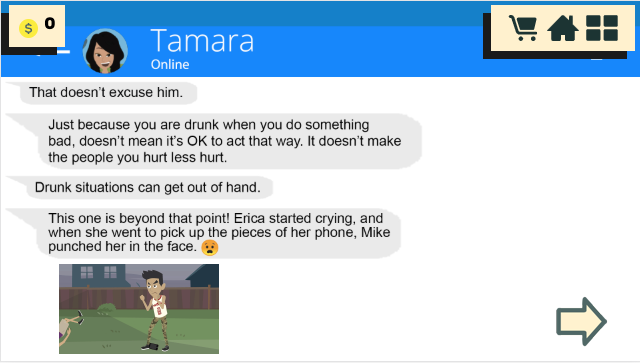As much as I believe what we do here at 7 Generation Games can benefit every student, I need to admit that the Crossroads: Games of Choices series being distributed by the Strong Mind Strong Body Foundation is a special case. In an era where some schools shy away from anything remotely controversial, we just released two games that discuss decision-making in situations like dating violence, family members addicted to alcohol or drugs, driving under the influence, depression and teen drug and alcohol use. That’s not even all of the topics covered.

We are so sure that these topics won’t be touched with some schools with a ten-foot pole that we actually are not including our decision-making games on our website. Crossroads is under beta testing now and promoted on The Julia Group site. In case you didn’t know, much of the research behind 7 Generation Games was done by The Julia Group and licensed by our company.
There are already schools that won’t use our Spirit Lake game because it has buffalo hunting and shooting arrows at rabid wolves who attack you. There are schools that won’t allow their fifth- through eighth-grade students to play Fish Lake because it has spearing fish and is thus “violent”. Arguments about historical accuracy won’t convince them. (You can download a free iPad demo of Fish Lake here or watch the Spirit Lake or Fish Lake video. Seriously, we’re not talking blood and guts here.)
Why make a game to teach decision-making
Given that we knew covering sensitive topics would cut into our market, why did we do it? Because it needed to be done. Some schools say that topics like how to get home from a party where everyone is high or drunk should be discussed with parents. We agree with that. However, there are two problems. First of all, as a parent who has raised four people through adolescence and managed not to kill any of them, I can tell you that teenagers don’t always listen to their parents. Even when they do, sometimes they need to hear the information from multiple perspectives. Secondly, not every parent is going to have these discussions. Maybe the students are in foster care. Maybe their parents are incarcerated, mentally ill, addicted to methamphetamine.
Stop right there before you accuse me of not valuing the parents in the school!
I once sat in on a meeting where an administrator yelled at us all,
“Just because people are poor doesn’t mean they’re trash!”
– Angry Bob
No one said they were. It’s also true that being poor or the parent of a child in school doesn’t make you a saint, either. There ARE people in the world who are in prison, have mental illness, are addicted to alcohol or drugs, etc. They DO have children. Do you honestly believe none of those children attend your school?
If you’re reading this, you’re probably not the person who doesn’t believe kids need to learn decision-making for high risk situations. Maybe you do believe it but you are in a school district that is so afraid of controversy that you have to watch everything you do and say.
We’re out to make educators’ lives easier, not harder
If you are interested in games on decision-making, please let us know. We’d be thrilled to add you to our beta testing group to measure effectiveness of these games. Or, you can just go to the App Store or Google Play and download the games for free while they are in beta mode.
On the other hand, we know that some schools link to all of our products. They don’t want to be fielding calls from irate community members demanding to know why their child is playing a game jumping over needles on the ground.
The third game in the Crossroads series, focused on younger students aged 9-13. It covers topics like child sexual abuse and witnessing domestic violence. We try to do things on an age appropriate level. For example, one scene ends with an adult saying in a creepy voice, “I’ve been trying to get you alone all night,” and the child saying, “Ow, let go, you’re hurting me!” Again, it’s not graphic but we know it can be triggering for some children and we don’t want them stumbling across it.
We think this is a crucially important area and if you are interested, feel free to download the games, distributed through the Strong Mind Strong Body Foundation.
